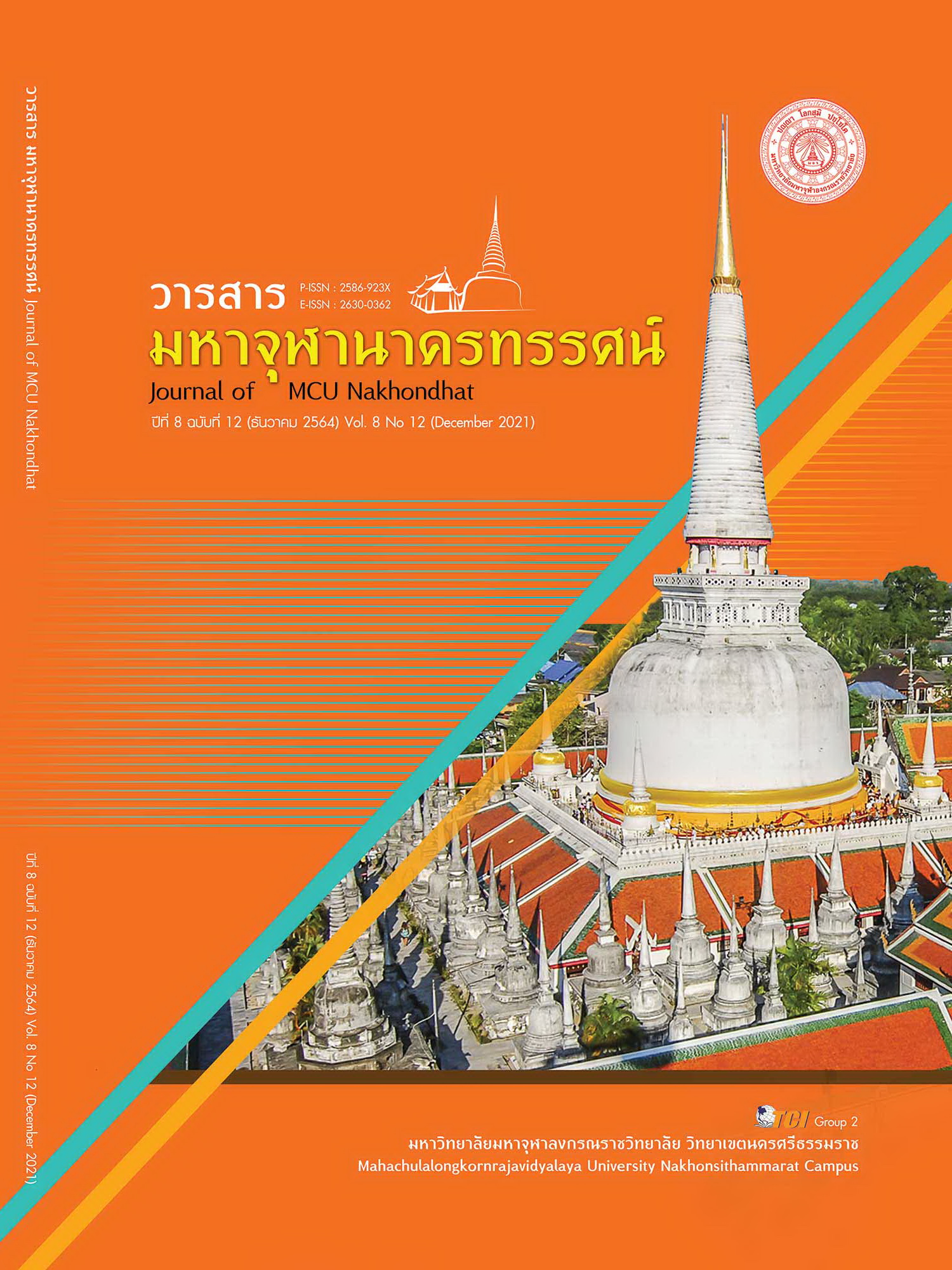APPLICATION OF THE SAPPURISADHAMMA PRINCIPLE IN THE ADMINISTRATION OF THE ADMINISTRATORS OF PAK NAM SUBDISTRICT ADMINISTRATIVE ORANIZATION, MUEANG CHUMPHON DISTRICT CHUMPHON PROVINCE
Main Article Content
Abstract
The Objectives of this research article were to 1) study the Sappurisa Dhamma principle applied to management of the Paknam sub district administrative organization, and 2) Appropriate guidelines for apply with similar context of other local government. This was research mix method such as quantitatively research using questionnaire, purposive sampling including 1) board of administrator, 2) administrative officer, 3) congressman, and 4) community leader for all 132 persons by using statistics, frequency, percent, mean, standard deviation and qualitative research using interview and discussion by key informant including 1) board of administrator, 2) administrative officer, 3) congressman of 12 persons. by content analyzing and summarizing. The result was found that 1) Sappurisa Dhamma principle applied to management of the Paknam sub district administrative organization was Dharma principles to practice as a good person and used for living the right life with good intentions, the outlook was at a high level. There are 7 things such as 1.1) knowing the cause, 1. 2) knowing the result, 1.3) knowing yourself, 1.4) knowing sufficiency, 1.5) knowing time, 1.6) knowing community and 1.7) knowing people. And 2) the suitable solution for apply with similar context of other local government such as 2.1) knowing the cause, studying problem to plan decide, solving the problem and follow-up evaluation, 2.2) knowing the results, analyzing people, working and evaluating results solve the problem, 2.3) knowing yourself, principles of thinking, Know how to act according to the situation, 2.4) knowing sufficiency, organization administration and reasonable valuation, 2.5) knowing time, time management and performance appraisal, 2.6) knowing community, awareness, moral in management, and 2.7) knowing people, meet often and heart swaps heart.
Article Details
References
ทวีศักดิ์ สุขกมล. (2561). การใช้หลักสัปปุริสธรรมในการบริหารงานเชิงบูรณาการของผู้บริหารเทศบาลตำบลป่าไหน่ อำเภอพร้าว จังหวัดเชียงใหม่. วารสารพุทธศาสตร์ศึกษา, 9(1), 79–92.
ธีระศักดิ์ บึงมุม และพรพิพัฒน์ เพิ่มผล. (2560). การพัฒนาบุคลากรตามหลักสัปปุริสธรรม 7 ในสถานศึกษาขั้นพื้นฐาน สำนักงานเขตพื้นที่การศึกษาประถมศึกษาขอนแก่น เขต 4. วารสารวิชาการ มหาวิทยาลัยกรุงเทพธนบุรี, 6(1), 49–60.
บุญชม ศรีสะอาด. (2561). วิธีการทางสถิติสำหรับการวิจัย เล่ม 2. กรุงเทพมหานคร: สุวีริยาการพิมพ์.
ปลัดองค์การบริหารส่วนตำบลปากน้ำ. (27 มีนาคม 2564). เรื่องการประยุกต์ใช้หลักสัปปุริสธรรมในการบริหารงานของคณะผู้บริหารองค์การบริหารส่วนตำบลปากน้ำ อำเภอเมืองชุมพร จังหวัดชุมพร. (พระสมุห์เจษฎา แดงบำรุง, ผู้สัมภาษณ์)
พระทองพจน์ ธีรธมฺโม (พรมราช) และคณะ. (2561). หลักสัปปุริสธรรมกับการแก้ไขวิกฤติปัญหาสังคม. วารสารสมาคมศิษย์เก่ามหาวิทยาลัยมหาจุฬาลงกรณราชวิทยาลัย, 6(1), 51–65.
พระอุดม อกิญฺจโน และคณะ. (2561). ความคิดเห็นของพระสังฆาธิการที่มีต่อภาวะผู้นำตามหลักสัปปุริสธรรม 7 ของพระราชวรเวที (ชิต ติกฺขปญฺโญ) เจ้าคณะจังหวัดสงขลา. วารสารสังคมศาสตร์และมานุษยวิทยาเชิงพุทธ, 3(2), 31–43.
รองนายกองค์การบริหารส่วนตำบลปากน้ำ. (29 มีนาคม 2564). เรื่องการประยุกต์ใช้หลักสัปปุริสธรรมในการบริหารงานของคณะผู้บริหารองค์การบริหารส่วนตำบลปากน้ำ อำเภอเมืองชุมพร จังหวัดชุมพร. (พระสมุห์เจษฎา แดงบำรุง, ผู้สัมภาษณ์)
ราชกิจจานุเบกษา. (2537). พระราชบัญญัติสภาตำบลและองค์การบริหารส่วนตำบล พ.ศ.2537 และที่แก้ไขเพิ่มเติมถึง (ฉบับที่ 6) พ.ศ.2552. เล่ม 11/ตอนที่ 53 ก วันที่ 2 ธันวาคม 2537.
ราชกิจจานุเบกษา. (2542). พระราชบัญญัติกําหนดแผนและขั้นตอนการกระจายอํานาจให้แก่องค์กรปกครองส่วนท้องถิ่น พ.ศ. 2542. เล่ม 116/ตอนที่ 114 ก วันที่ 17 พฤศจิกายน 2542.
วีระ หาญกัน. (2559). การบริหารงานตามหลักธรรมภิบาลขององค์การบริหารส่วนตำบลบ้านดง อำเภอแม่เมาะ จังหวัดลำปาง. ใน วิทยานิพนธ์รัฐประศาสนศาสตรมหาบัณฑิต สาขาวิชาการบริหารและพัฒนาประชาคมเมืองและชนบท. มหาวิทยาลัยราชภัฎลำปาง.
สนทนากลุ่ม. (31 มีนาคม 2564). เรื่องการประยุกต์ใช้หลักสัปปุริสธรรมในการบริหารงานของคณะผู้บริหารองค์การบริหารส่วนตำบลปากน้ำ อำเภอเมืองชุมพร จังหวัดชุมพร. (พระสมุห์เจษฎา แดงบำรุง, ผู้สัมภาษณ์)
สำนักงานคณะกรรมการกฤษฎีกา. (2547). รวมความเห็นคณะกรรมการกฤษฎีกาเกี่ยวกับองค์กรปกครองส่วนท้องถิ่น : พระราชบัญญัติสภาอำเภอและองค์การบริหารส่วนตำบล พ.ศ. 2537 และ พระราชบัญญัติกำหนดและขั้นตอนการกระจายอำนาจให้แก่องค์กรปกครองส่วนท้องถิ่น พ.ศ. 2542. กรุงเทพมหานคร: สถาบันพระปกเกล้า.
องค์การบริหารส่วนตำบลปากน้ำ. (2562). แผนพัฒนาท้องถิ่น 4 ปี (พ.ศ. 2561–2564). ชุมพร: องค์การบริหารส่วนตำบลปากน้ำ.
องค์การบริหารส่วนตำบลปากน้ำ. (2563). ข้อมูลพื้นฐาน. เรียกใช้เมื่อ 24 พฤศจิกายน 2563 จาก http://www. paknamsatun.go.th/ product_images/4-05032564-1.pdf
Cronbach, L. J. (1990). Essentials of psychological testing. (5th ed.). New York: Harper Collins. Publishers.
Krejcie, R. V. & Morgan, D. W. (1970). Determining Sample Size for Research Activities. Educational and Psychological Measurement, 30(3), 607-610.
Likert, R. (1967). “The Method of Constructing and Attitude Scale”. In Reading in Fishbeic, M (Ed.), Attitude Theory and Measurement. New York: Wiley & Son.


